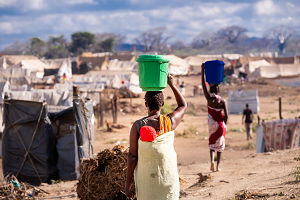SRHR in humanitarian crises: Ensure the safety and health of women and girls
More than 26 million women and girls of reproductive age worldwide have been forced away from their homes, fleeing natural disasters, drought, famine and war, and now live in refugee camps and crises zones.
Anyone who has been forced to flee is particularly vulnerable, even more so women and girls: their access to health services may be suspended or the quality may be very low and they will not have access to life-saving reproductive health care. They are in a dire state of emergency and further exposed at increased risk of sexual violence, sexually transmitted infections including HIV and unintended pregnancies.
Amid the terrifying devastation experienced through a humanitarian crisis, people need first and foremost safety and protection. Sexual and reproductive health services can save the lives of women and prevent their further suffering.
In this factsheet we look at the key actions that humanitarian donors and actors can take in order to provide sexual and reproductive health to people in emergency situations, but also in the long-term by building up Universal Health Coverage. We also look at actions to be taken to prevent and respond to sexual and gender-based violence through sexual and reproductive health care. Read more.
Find out more about how parliamentarians can help ensure the safety and health of women and girls in crisis. Also available in Spanish.
